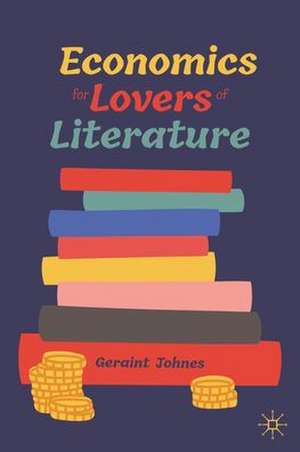Economics for Lovers of Literature
Autor Geraint Johnesen Limba Engleză Hardback – 30 mai 2023
Interweaving literary examples with easy-to-follow explanations and reflective tasks, the book takes an interdisciplinary approach to economics and literature that requires no prior knowledge in either camp, but which illuminates patterns of real-world behaviour observed by novelists and economists alike. This concise and accessible book will be a valuable tool for students embarking on introductory economics courses, economics modules in business studies, and interdisciplinary courses more broadly, as well as the general reader interested in building their knowledge of economics.
| Toate formatele și edițiile | Preț | Express |
|---|---|---|
| Paperback (1) | 148.65 lei 39-44 zile | |
| Springer Nature Switzerland – 31 mai 2024 | 148.65 lei 39-44 zile | |
| Hardback (1) | 133.41 lei 3-5 săpt. | +14.91 lei 6-12 zile |
| Springer Nature Switzerland – 30 mai 2023 | 133.41 lei 3-5 săpt. | +14.91 lei 6-12 zile |
Preț: 133.41 lei
Nou
Puncte Express: 200
Preț estimativ în valută:
25.53€ • 26.60$ • 21.14£
25.53€ • 26.60$ • 21.14£
Carte disponibilă
Livrare economică 13-27 martie
Livrare express 26 februarie-04 martie pentru 24.90 lei
Preluare comenzi: 021 569.72.76
Specificații
ISBN-13: 9783031264856
ISBN-10: 3031264851
Pagini: 95
Ilustrații: VII, 95 p. 1 illus.
Dimensiuni: 155 x 235 x 14 mm
Greutate: 0.33 kg
Ediția:2023
Editura: Springer Nature Switzerland
Colecția Palgrave Macmillan
Locul publicării:Cham, Switzerland
ISBN-10: 3031264851
Pagini: 95
Ilustrații: VII, 95 p. 1 illus.
Dimensiuni: 155 x 235 x 14 mm
Greutate: 0.33 kg
Ediția:2023
Editura: Springer Nature Switzerland
Colecția Palgrave Macmillan
Locul publicării:Cham, Switzerland
Cuprins
1. Introduction.- 2. The Price of Oysters (demand and supply).- 3. When You’ve Got to Go, You’ve Got to Go (pricing).- 4. The Competition is Tough (perfect competition).- 5. Why Trade is Good 1 (economic welfare).- 6. Last Copy, Sir: Double Price (monopoly).- 7. The Kursaal Flyers (game theory and oligopoly).- 8. Gizza Job (labour markets).- 9. Greta’s Expectations (externalities and the environment).- 10. Why Trade is Good 2 (international trade).- 11. Well, What Do You Know? (information economics).- 12. Don’t Behave Like That (behavioural economics).- 13. The Swings and Roundabouts of Outrageous Fortune (business cycles).- 14. If It Moves, Tax It (fiscal policy).- 15. The Employers and the Employed (unemployment).- 16. Interesting Times (monetary policy).- 17. From Small Things, Big Things Come (modern approaches to macroeconomics).- 18. Growing Pains (economic growth).
Notă biografică
Geraint Johnes is Emeritus Professor of Economics at Lancaster University, and has also worked at Dartmouth College New Hampshire, Lehigh University in Pennsylvania, the Australian National Univeristy, and Beijing Normal University. He has also served as director of the London-based think-tank, the Work Foundation, and is regularly in demand as an economic commentator on global TV news channels including the BBC, ITV, Al Jazeera, Deutsche Welle, and France 24. He was founding editor of the journal, Education Economics, and was previously editor also of the International Journal of Manpower. He is author of numerous articles in major journals, and has authored and edited books most recently including the Handbook of Contemporary Education Economics (Edward Elgar, 2017).
Textul de pe ultima copertă
This book provides an engaging introduction to economics through a literary lens. Drawing on writers such as James Joyce, George Eliot, Edith Wharton, Jane Austen, Charlotte Bronte, and Elizabeth Gaskell, each chapter is framed around a quote from a classic text of English literature that helps tease out a key economic concept and demonstrate its broader relevance. While rigorous, the book is virtually free of technical language and aims to give a concise overview of all the main topics in contemporary economics – from supply and demand, pricing, labour markets, externalities, and game theory, to environmental and behavioural economics, fiscal policy and business cycles, modern approaches to macroeconomics and economic growth.
Interweaving literary examples with easy-to-follow explanations and reflective tasks, the book takes an interdisciplinary approach to economics and literature that requires no prior knowledge in either camp, but which illuminates patterns of real-world behaviour observed by novelists and economists alike. This concise and accessible book will be a valuable tool for students embarking on introductory economics courses, economics modules in business studies, and interdisciplinary courses more broadly, as well as the general reader interested in building their knowledge of economics.
Geraint Johnes is Emeritus Professor of Economics at Lancaster University, and has also worked at Dartmouth College New Hampshire, Lehigh University in Pennsylvania, the Australian National Univeristy, and Beijing Normal University. He has also served as director of the London-based think-tank, the Work Foundation, and is regularly in demand as an economic commentator on global TV news channels including the BBC, ITV, Al Jazeera, Deutsche Welle, and France 24. He was founding editor of the journal, Education Economics, and was previously editor also of the International Journal of Manpower. He is authorof numerous articles in major journals, and has authored and edited books most recently including the Handbook of Contemporary Education Economics (Edward Elgar, 2017).
Geraint Johnes is Emeritus Professor of Economics at Lancaster University, and has also worked at Dartmouth College New Hampshire, Lehigh University in Pennsylvania, the Australian National Univeristy, and Beijing Normal University. He has also served as director of the London-based think-tank, the Work Foundation, and is regularly in demand as an economic commentator on global TV news channels including the BBC, ITV, Al Jazeera, Deutsche Welle, and France 24. He was founding editor of the journal, Education Economics, and was previously editor also of the International Journal of Manpower. He is authorof numerous articles in major journals, and has authored and edited books most recently including the Handbook of Contemporary Education Economics (Edward Elgar, 2017).
Caracteristici
Blends literature with economics to demonstrate real-life relevance of economic concepts Demonstrates how literature can give provide insight into economic theories and concepts Takes an accessible interdisciplinary approach to introductory economics
